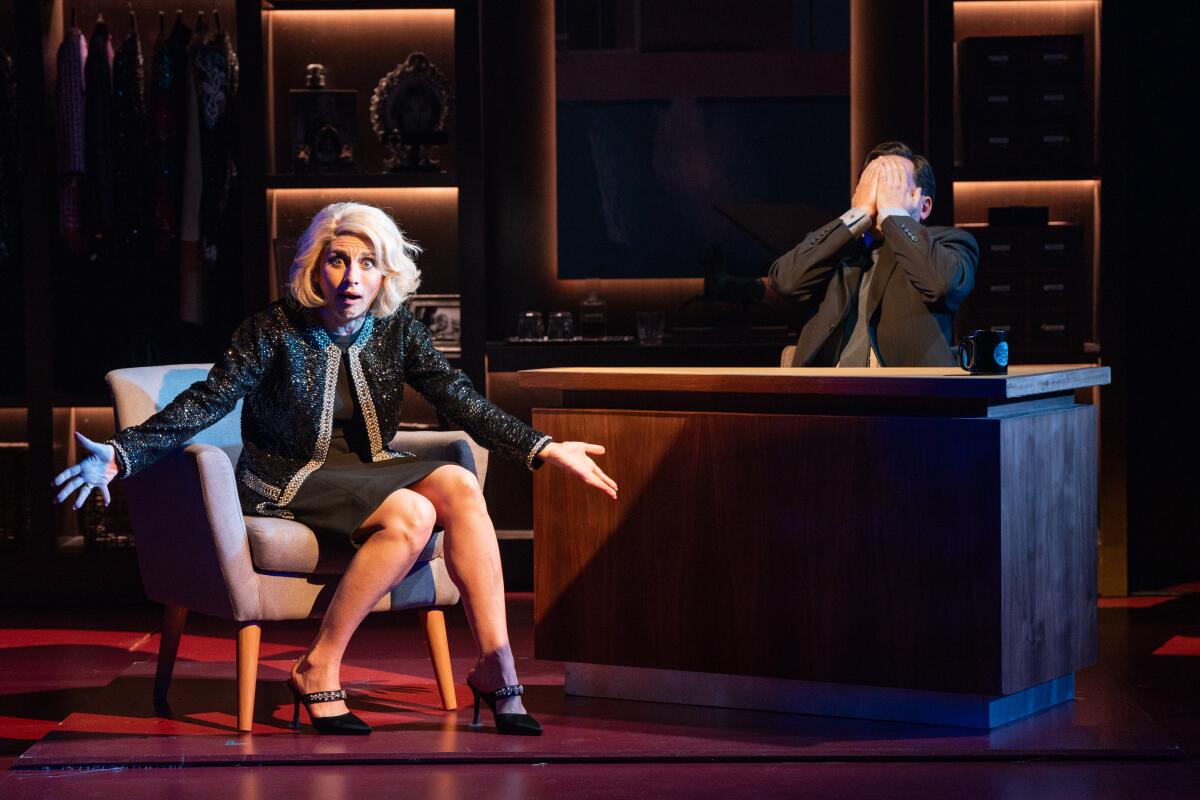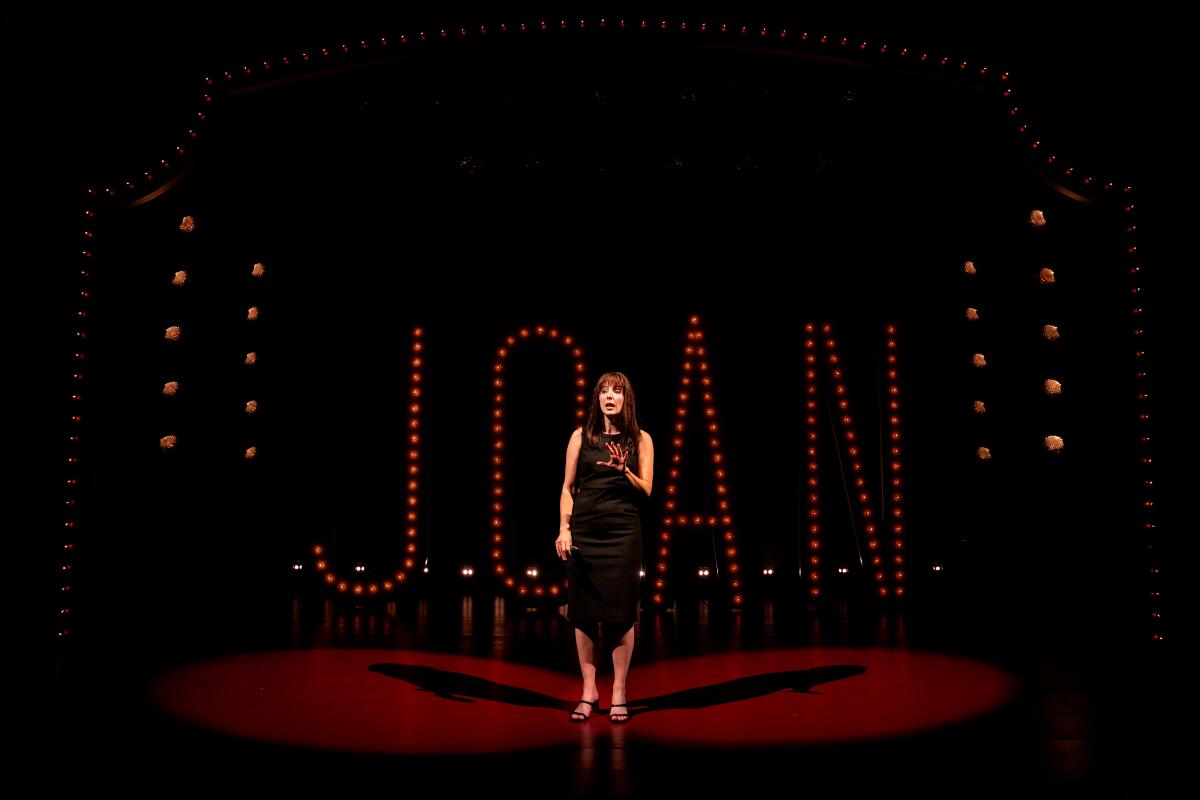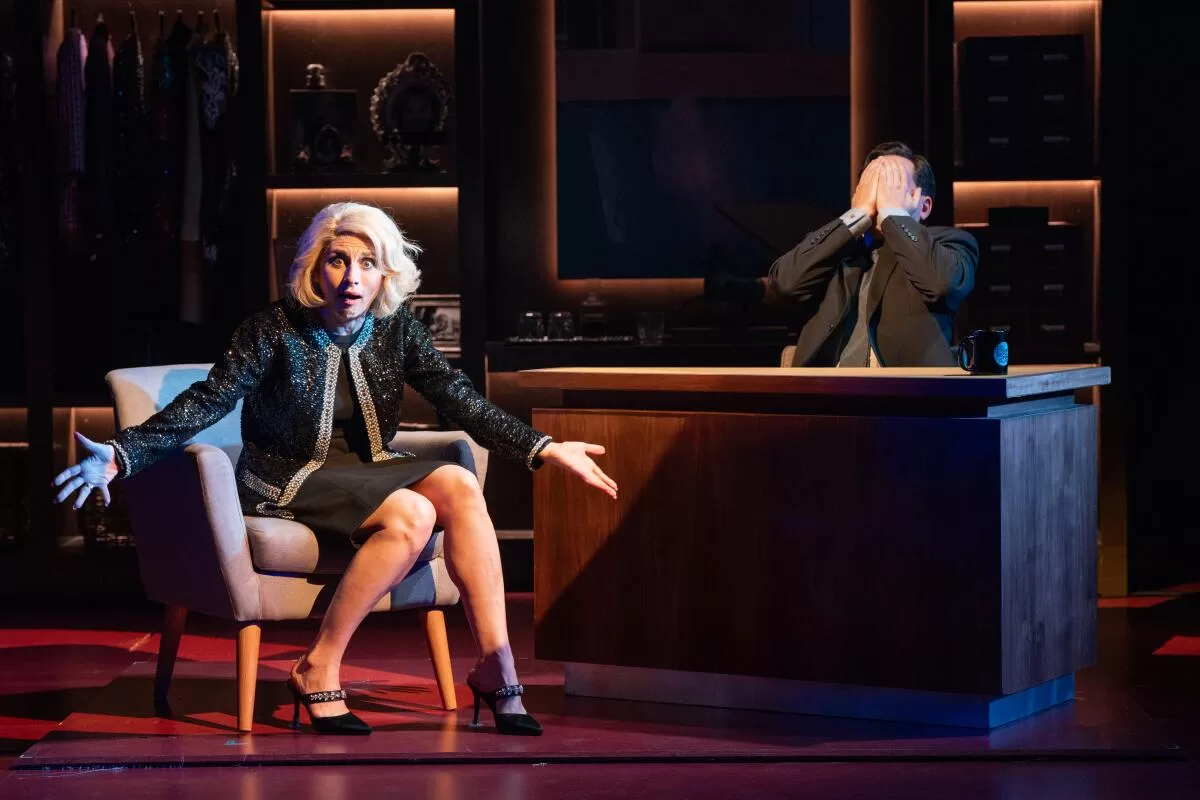“Can we talk?” Joan Rivers’ stand-up tagline had a way of turning audiences into confidants.
Rivers may be remembered for her relentless jokes about Elizabeth Taylor’s weight, but she herself was her most relentless target. Making fun of her looks, her sex life, her miserable childhood earned her not only the adoration of fans but also their trust. She was the candid cutup they’d like to have on speed-dial.
Making a play about the life and career of Rivers, who died suddenly in 2014 while undergoing a medical procedure, is challenging not because her story wasn’t dramatic but because there was no one like her. How do you bring her audacious wit, rampaging delivery and path-breaking fearlessness back to life?
“Joan,” a new play by Daniel Goldstein directed by David Ivers at South Coast Repertory, gives it a shot by divvying up the central role between two actors. Elinor Gunn portrays young Joan while Tessa Auberjonois plays the beloved comic. The more famous version of the character, as you might imagine, is harder to get right.
Auberjonois gives a rough approximation of Rivers’ New York accent but can’t master her comic timing. (Who could?) The jokes Joan tells are funny because they’re so outrageous — not because of how they’re told.
The performance sticks to the persona. Joan’s expensive clothes and tight face lend the impression of a Bel-Air battleship. Auberjonois captures the breathless ambition along with the insecurity that fueled Rivers’ drive. But it’s Young Joan who fills us in on the comic’s origin story.
Rivers knew she was special, but she suffered from low self-esteem. Pudgy as a girl and not particularly popular with the boys, she refused to be judged by patriarchal standards even if she judged herself harshly for falling short. Making people laugh was her revenge on society’s shortsightedness.
Her parents, Russian Jewish immigrants, were as conventional as they were upwardly mobile. Dr. and Mrs. Molinsky (played by Andrew Borba and Auberjonois) worked their way to Larchmont, a tony New York suburb, and expected Joan to settle down with a well-off husband in a comparably wealthy town.
Their daughter’s determination to become a comic was perplexing to them, to say the least. Young Joan married young, but her professional dream refused to die and the marriage ended not long after she realized that the rush of stand-up was more intense than the relief she felt at having nabbed a husband.
Goldstein’s background is in musical theater — he won the Kleban Prize for most promising musical theater librettist — and “Joan” is written in the broad, episodic style that musicals enjoy. (Having arrived a few minutes late because of crashes on the 405, I read the script to confirm my assessment.) No one is holding a vehicle like “Joan” to Chekhovian standards. Audiences are happy to spend time in the company of a celebrity protagonist.

Tessa Auberjonois as Joan Rivers and Zachary Prince as Jimmy Fallon in “Joan” at South Coast Repertory.
(Scott Smeltzer)
But a playwright must figure out what story he’d like to pull out of the mass of real-life material. Goldstein opts for the Wikipedia overview. This is a mistake that Aristotle cautioned against in “Poetics.” A strong plot, he asserted in his unmatched analysis of tragedy, is not the same as an interesting biography, because “infinitely various are the incidents in one man’s life,” while effective drama depends on consequential action as a unifying focus.
Goldstein has plenty of consequential actions to choose from, but he slides into a recap of a story that I mostly already knew from interviews and the superb documentary “Joan Rivers: A Piece of Work.” “The Marvelous Mrs. Maisel” and “Hacks” — both of which use Rivers’ life, to varying degrees, as a model for their protagonists — have taken us inside the personal and professional hurdles of being a trailblazing female stand-up comic in the Rivers mode.
“Joan” is very much an authorized bio-drama. The playwright has had the blessing of daughter Melissa Rivers, who is not only a creative consultant but also a central character (played by Gunn). Not that the play is one-sided. Rivers is too complicated a personality for hagiography. Her fallout with Johnny Carson (Borba), who never forgave her for starting a rival late-night talk show after he had made her his show’s permanent guest host, is handled with exceptional fairness to him.
The suicide of Edgar Rosenberg (Borba), Rivers’ second husband and Melissa’s father, who fell into a terrible depression after Rivers’ talk show on Fox went kaput, also is treated with admirable complexity. The network gave Rivers an ultimatum — either Edgar goes as a producer or the show is canceled. She sided with her husband but then held it against him.
It’s tragically sad, and it ties back to the central conflict of Rivers’ life — success vs. traditional happiness. She wanted it all, but comedy was her true soul mate.
Melissa’s presence in “Joan” is intriguing but ultimately distracting. She sets up the play, explaining to the audience how the fluid casting will work. (Zachary Prince rounds out the multitasking ensemble.) She also serves as a witness and occasional contradicting commentator.
After the death of Edgar, Joan and Melissa, now BFFs and work partners, help each other survive the impossible. Joan’s death yields the summing up to Melissa. She has an epiphany about her own ambitiousness, the apple not falling far from the tree. But by this point, the play has fully succumbed to reportage.

Elinor Gunn in “Joan” at South Coast Rep.
(Scott Smeltzer)
I interviewed Rivers in San Francisco when she was workshopping a theater project and had lunch with her the following year after I reviewed her play “Joan Rivers: A Work in Progress by a Life in Progress” at the Geffen Playhouse. She wanted to pick my brain on how she could make it better. I told her to call playwright and drag artist Charles Busch and ask him to do an overhaul.
The main impression I had of Rivers was that she was whip-smart — not just quick but wise. She had no vanity about the hustle of showbiz. She shared with a drama critic she hardly knew just what went into her decision making. I not only liked her but admired her frankness.
My earliest memory of Rivers comes from an anthology comedy album that was passed down to me as a boy. In high school, I would stay up late whenever she was on “The Tonight Show.” When I was an editor at the Village Voice, she used to test out material at a club in the East Village near my office, and I sometimes would go after we closed the paper. This was Rivers unplugged, foul-mouthed in a way that made me feel like a squeamish altar boy. (No easy task!)
She never played it safe, though I have to confess I found her comedy out of sync with the times when I watched the 2012 TV special “Joan Rivers: Don’t Start With Me” a couple of years ago. She was a First Amendment absolutist when it came to humor, but comedy evolves and one generation’s daring hilarity is another’s insensitive cruelty. (A riff about the physical characteristics of Mexicans made me cringe.)
In trying to tell Rivers’ whole story, “Joan” winds up skimming the surface. I would have ended the play sooner. One possibility would be when she returns to stand-up after Edgar’s shocking death, making jokes about a tragedy that had ripped her heart out. Her indomitable will to stay in the game was her noble strength — and perhaps also her personal flaw.
David Mamet might know how to make the most of a character like Joan Rivers, an entertainment hero and antihero, whose story was an American one of success at any cost. That Rivers bore that cost with intrepid humor is worthy of drama. “Joan” doesn’t quite do her justice, but she was a tough act to follow.
‘Joan’
Where: South Coast Repertory, 655 Town Center Drive, Costa Mesa
When: 7:45 p.m. Wednesday-Friday, 2 and 7:45 p.m. Saturday, 2 p.m. Sunday. Ends Nov. 24. (Check schedule for additions.)
Tickets: $35-$114
Information: (714) 708-5555 or scr.org
Running time: 1 hour, 40 minutes (no intermission)
